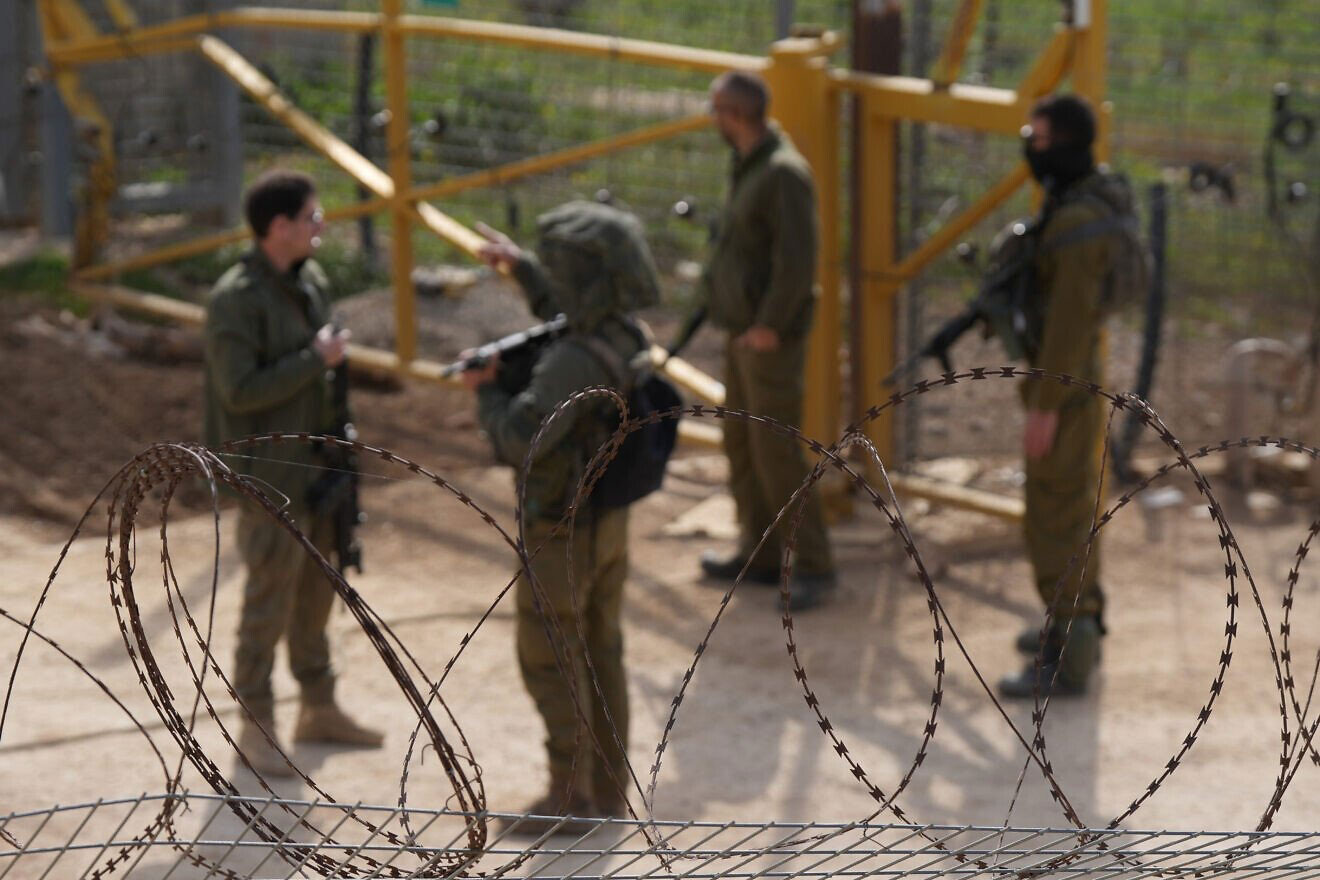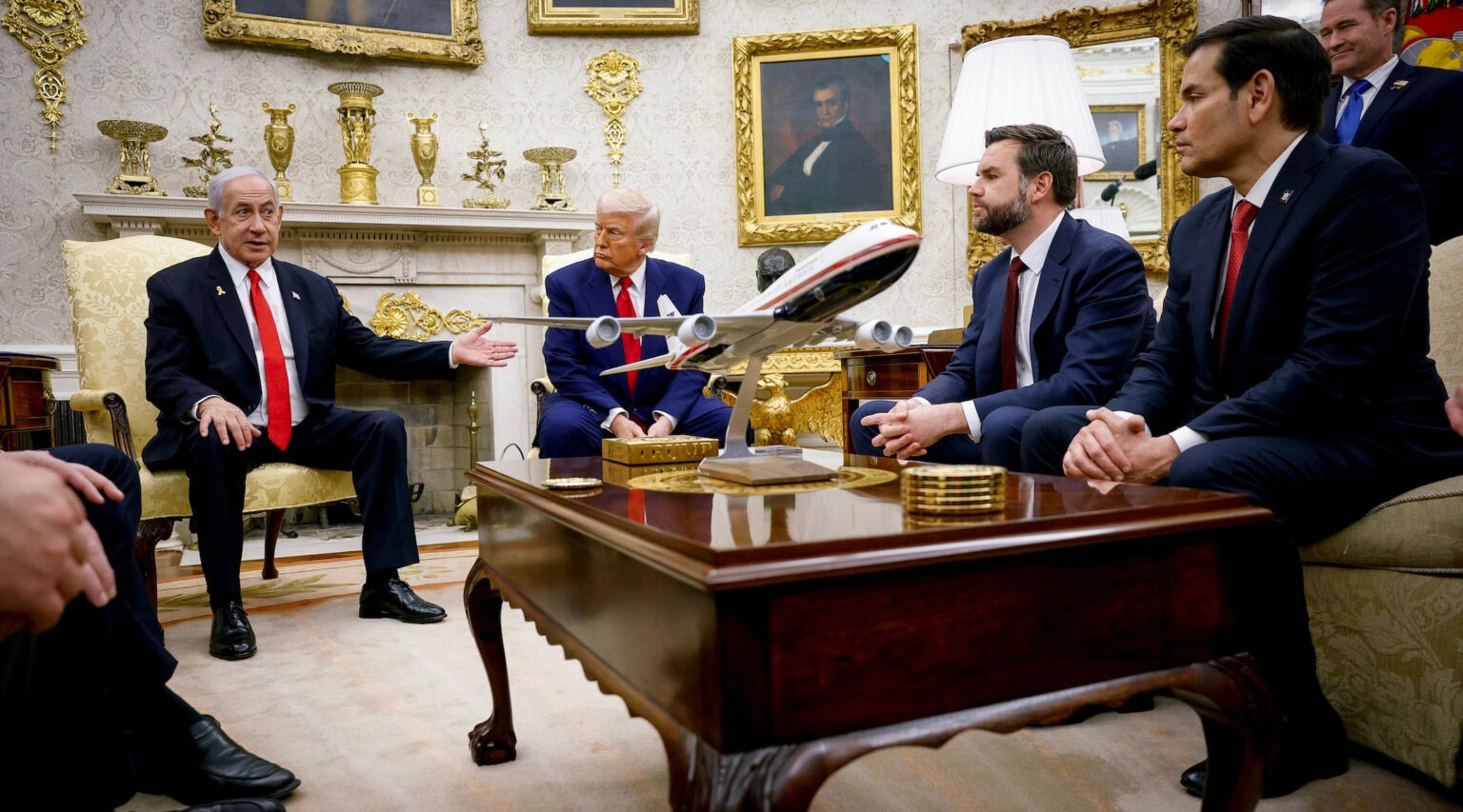Courtesy of JNS. Photo credit: Ayal Margolin/Flash90
Israeli soldiers on the border fence on the Israeli border with Syria, northern Israel, March 14, 2025
(JNS) — The U.N. Security Council held an emergency session on Thursday to address Israeli airstrikes in Syria, with Jerusalem’s deputy envoy insisting that the attacks targeting jihadi infrastructure are meant to avert the next Oct. 7, 2023-type massacre.
“These groups in southern Syria are working to establish military infrastructure in areas just kilometers from Israeli communities,” Jonathan Miller told the council. “That infrastructure includes rocket launches, explosives and underground facilities all designed to threaten the lives of innocent civilians.”
“Israel cannot and will not allow this to happen. We have been clear and consistent. This is our policy,” the Israeli diplomat said. “We will do whatever is necessary for however long it takes to prevent another Oct. 7,” referring to the Hamas-led terrorist attacks in southern Israel that left 1,200 dead and 251 others taken hostage into Gaza.
The meeting was held at the behest of Algeria and Somalia.
Since the fall of former Syrian President Bashar Assad in December, Israel has conducted hundreds of airstrikes in Syrian territory and expanded its control in the strategic Golan Heights.
Syria is ruled by Hay’at Tahrir al-Sham, an Islamist political and paramilitary organization that remains a U.S.-designated terror group. Washington has diplomatically separated HTS from the ruling government to establish communication with and lift certain sanctions on the latter.
Earlier this month, Israeli airstrikes targeted the Hama and Tiyas air bases, as well as the southern province of Daraa, where it also launched a ground incursion.
The Israel Defense Forces said the incursion was in response to gunfire on Israeli troops, who were “seizing weapons and destroying terrorist infrastructure.”
The strikes came amid reports that Turkey is looking to establish control of airbases and to deploy aerial-defense systems there. Israel strongly opposes that; such deployment was the subject of talks earlier this week between Israeli and Turkish delegations in Azerbaijan, at the urging of U.S. President Donald Trump.
Miller told the council that Israel does not aim to take more territory, contrary to claims from some council members.
“Our actions are guided not by ambition of expansion but purely by necessity, security and prevention,” he said.
‘The challenges are not going away’
During a ground operation in central Syria, Israeli special forces uncovered an Iranian-constructed underground missile factory that Miller called a “factory of death.”
The factory had “already begun producing precision-guided missiles, several of which were subsequently used in attacks on Israeli territory by Hezbollah,” the Israeli diplomat said.
Hamas, Palestinian Islamic Jihad and other terror groups in Syria pose threats not only to Israel but also to the minority Druze communities in southern Syria, according to Miller.
“We urge this council to adopt a posture grounded in realism, not political rhetoric,” he said. “The challenges in Syria are not going away. If left unaddressed, they will grow, and they will not remain confined to one order.”
‘Control of water resources’
Dorothy Shea, the U.S. interim envoy to the United Nations, told the council that Washington shares Israel’s terror concerns in Syria.
“Both our countries have been clear that we oppose malign actors using Syria as a platform to foment instability,” she stated. “We know that ISIS and Al-Qaeda continue to plot and conduct attacks within Syria, and we know Hezbollah and other Iran-backed terrorists are trying to regain a foothold in Syria to threaten Israel and other regional states.”
Shea expressed cautious optimism that the new Syrian government will live up to its pledges to root out terrorism within its borders.
The U.S. envoy called on the council to do the same and to “recommit itself to combating terrorism in Syria, call on Iran and other external actors to stop arming and advising terrorist groups, and urge regional states to rein in the actions of proxies who threaten regional peace and security.”
Syria accused Israel of interfering in its domestic affairs and of stealing water resources.
Israel has “taken control of water resources in the south and diverted river routes, which threatens the country’s water and food security,” according to Qusay Al-Dahhak, Syria’s ambassador to the United Nations.
He called on the council to “condemn Israeli aggressions and take immediate and decisive action to compel Israel to halt its aggression without delay.”
Several countries claimed on Thursday that Israel’s actions threatened the new Syrian government’s ability to function.
Vassily Nebenzia, Russia’s envoy to the global body, said the “new Syrian authorities continue not to demonstrate hostile intent vis-à-vis Israel.”
Jerusalem’s actions “are a gross violation of Syrian sovereignty and territorial integrity, which under no circumstances need to be called into question, regardless of who holds power,” he said.




